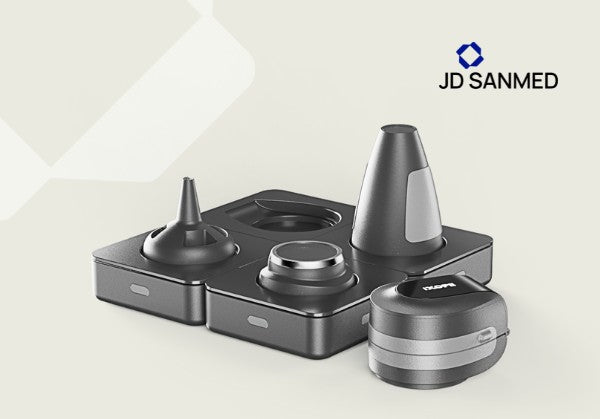How iXope Is Revolutionising General Practice: 5 Powerful Ways It Supports Doctors and Improves Care

General practitioners are the cornerstone of the healthcare system - managing everything from chronic diseases and acute infections to preventative screenings and minor procedures. But the tools available in most general practices haven’t evolved at the same pace as patient needs or digital expectations.
Traditional diagnostic instruments like otoscopes, ophthalmoscopes, and dermatoscopes are often analogue, lack documentation capability, and require face-to-face proximity that’s uncomfortable for both doctors and patients. Smartphone adapters, often used as a workaround, are flimsy, insecure, and medically inconsistent.
iXope is purpose-built to overcome these limitations. It’s a portable, wireless, multifunctional diagnostic and surgical device that integrates cutting-edge optics, digital imaging, EMR compatibility, and portability—giving GPs the tools they need to deliver modern, efficient, and patient-friendly care.
Here are five critical ways iXope is transforming the way GPs work—and how it’s saving time, improving outcomes, and reducing costs across the system.
1. All-in-One Diagnostic Power
Most general practices use separate tools to examine ears, eyes, and skin—leading to a disjointed workflow, multiple cleaning protocols, and frequent switching between devices. iXope integrates:
-
Otoscopy: High-definition examination of the tympanic membrane, including support for managing otitis media, tympanic perforations, or wax removal.
-
Ophthalmoscopy: Retinal imaging for diabetic retinopathy and macular degeneration, with magnification comparable to slit lamps and built-in blue light for fluorescein exams.
-
Dermatoscopy: Polarised and non-polarised imaging of skin lesions, rashes, or wounds.
-
Minor surgical capability: As a general-purpose surgical microscope, iXope supports ear wax removal, foreign body extraction, suturing, and skin procedures under magnification.
Benefit: Reduces the number of devices required, improves ergonomics, and saves valuable time during short consultations.
2. Clear Imaging, Real-Time Documentation, and EMR Integration
With traditional tools, there’s no way to visually document what was seen. Doctors must rely on written descriptions that are subjective and hard to compare at follow-up.
iXope captures clinical-grade images and videos, offering:
-
Clear documentation of findings
-
Side-by-side comparison across visits
-
Seamless upload into the patient’s EMR
Benefit: Streamlines documentation, improves continuity of care, supports audits, and reduces medico-legal risk.
3. Remote, Rural, and Outreach-Ready
Many communities lack access to high-quality diagnostic equipment or specialist services. iXope’s design allows it to go wherever care is needed:
-
Lightweight and battery-powered for mobility
-
Durable and easy to clean between visits
-
Suitable for aged care, remote communities, telehealth, mobile clinics, and home visits
Benefit: Enables hospital-quality diagnostics outside the hospital, keeping patients in the community and avoiding unnecessary referrals.
4. Improves Patient Understanding, Comfort, and Compliance
With traditional ophthalmoscopes, doctors must get very close to the patient’s face—a barrier during COVID, and often uncomfortable for both parties. And without images, patients have little visual understanding of their condition.
With iXope:
-
Doctors maintain a comfortable working distance
-
Real-time images are displayed on screen
-
Patients can see what the doctor sees
Benefit: Enhances trust, improves patient education, and boosts follow-up compliance.
5. Supports Collaboration, Privacy, and Clinical Consistency
Many clinicians use smartphone adapters to try and capture diagnostic images—but these come with serious drawbacks:
-
Unstable or poor alignment, leading to inconsistent quality
-
Images stored on personal devices, violating privacy and confidentiality
-
Variable colour reproduction and lighting inconsistencies
iXope addresses these concerns by providing:
-
A secure, integrated platform for image capture
-
Reliable, colour-accurate optics
-
Direct storage into medical systems—not on private phones
It also allows images to be shared with:
-
Other GPs or nurses for shared care
-
Specialists for remote second opinions
-
Hospitals for streamlined referral triage
Benefit: Better team communication, better outcomes, and fewer unnecessary hospital presentations.
Additional Benefits: Saving Time, Money, and Healthcare Resources
By enabling GPs to confidently handle minor procedures and chronic disease management, iXope:
-
Reduces follow-up visits—e.g. fewer appointments to track healing after corneal injury or lesion removal
-
Keeps manageable conditions out of emergency departments
-
Prevents unnecessary referrals to ENT, dermatology, or ophthalmology
-
Saves time for doctors and hospitals—and money for the taxpayer
Example: A corneal foreign body case that would normally involve 2–3 follow-ups, an ED visit, or a specialist referral can often be fully managed in general practice with iXope—thanks to proper magnification, fluorescein-guided visualisation, documentation, and monitoring.
Conclusion: A Digital Diagnostic Upgrade for the Modern GP
General practitioners need smarter tools to meet the demands of modern healthcare. iXope offers that step change—combining technology, portability, and efficiency in one compact device.
Whether you’re diagnosing a diabetic retina, documenting a skin lesion, removing a foreign body, or teaching a registrar, iXope gives you what conventional tools and smartphones cannot: clarity, confidence, and control.
It helps GPs:
-
Work faster
-
Make more accurate decisions
-
Improve documentation
-
Enhance patient trust
-
And reduce overall system burden
Ready to Modernise Your Practice?
See how iXope can transform your clinical workflow.
Book a demonstration or get in touch to trial iXope in your practice.



